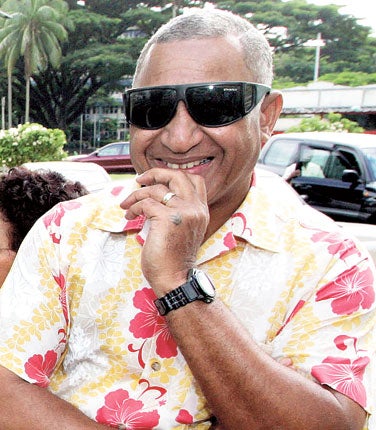A commodore, a coup and an island in chaos
Judiciary sacked after speaking out against Fiji's 'illegal' regime

Your support helps us to tell the story
From reproductive rights to climate change to Big Tech, The Independent is on the ground when the story is developing. Whether it's investigating the financials of Elon Musk's pro-Trump PAC or producing our latest documentary, 'The A Word', which shines a light on the American women fighting for reproductive rights, we know how important it is to parse out the facts from the messaging.
At such a critical moment in US history, we need reporters on the ground. Your donation allows us to keep sending journalists to speak to both sides of the story.
The Independent is trusted by Americans across the entire political spectrum. And unlike many other quality news outlets, we choose not to lock Americans out of our reporting and analysis with paywalls. We believe quality journalism should be available to everyone, paid for by those who can afford it.
Your support makes all the difference.Fiji, which has lurched from one coup to the next in recent years, was plunged into fresh political turmoil yesterday after its self-appointed President tore up the constitution, sacked the judiciary and ruled out democratic elections until 2014.
The move, greeted with dismay by Fiji's neighbours, came 24 hours after the country's Court of Appeal pronounced the military government led by Frank Bainimarama invalid. Commodore Bainimarama, head of the armed forces, seized power in 2006 and has run the South Pacific island nation – a former British colony and popular tourism destination – as a virtual dictatorship since then.
Among the judges dismissed by President Josefa Iloilo were the three who on Thursday declared Commodore Bainimarama's coup illegal. The ageing, ailing Mr Iloilo told Fijians in a national televised address, rather chillingly, that he was establishing a "new order". He is expected to reappoint the maverick commodore, a close friend, as Prime Minister.
The dramatic worsening of the political situation in a country once viewed as a tropical paradise followed calls earlier this week by the US Secretary of State, Hillary Clinton, for a date to be set for democratic elections by 1 May. The 16-nation Pacific Islands Forum has threatened to suspend Fiji unless it meets that deadline, and the Commonwealth says it will take similar action.
Rod Alley, a senior fellow at New Zealand's Centre for Strategic Studies, said of the President's televised address: "It looked like a prepared statement by Bainimarama, delivered by Iloilo. This is extraordinary and doesn't look good for Fiji."
As security was stepped up across Fiji yesterday, Australia warned of possible violence. The Prime Minister, Kevin Rudd, led a chorus of condemnation of Mr Iloilo's announcement, calling it "a grave and unwelcome development" and urging the President "to take Fiji forwards and not backwards". Commodore Bainimarama is a colourful figure, prominent in Fijian public life since 2000. He led a military force that intervened to restore law and order following a coup staged by George Speight, a former businessman whose followers held the then prime minister and cabinet hostage inside parliament for two months.
The armed forces chief led his own coup – Fiji's fourth such takeover in 20 years – in December 2006 after Laisenia Qarase, who had won two free elections, resisted his demands to resign. Mr Iloilo, who is 88 and suffers from Parkinson's disease, was appointed President in 2000 by Mr Speight.
Supplanted by Commodore Bainimarama, who assumed presidential powers following his coup, he was reappointed a few weeks later by the coup leader. The following day, Mr Iloilo – believed to be the world's oldest head of state – appointed the Commodore Prime Minister.
Thursday's Court of Appeal decision, which upheld a legal challenge to the military regime by the ousted Mr Qarase, left Fiji – an archipelago of more than 300 palm-fringed islands – in limbo. The judges instructed the President to dissolve parliament, appoint an independent caretaker prime minister and prepare the nation for prompt elections.
Instead, Mr Iloilo reappointed himself, awarded himself executive powers and abrogated the constitution – a decision that the President "came up with ... on his own", Commodore Bainimarama assured Radio Australia yesterday. The latter added that he would be willing to return to the job of prime minister.
The Commodore, a rugby fanatic and military history buff who has trained in Australia and the US, likes to portray himself as a champion of multiculturalism. He claimed to be putting off elections only in order to rewrite the constitution, which he said accentuated divisions between ethnic Indians and indigenous Fijians. Critics accuse him of wanting only to cling to military-backed power for as long as possible, caring little about Fiji's status as an international pariah, and the impact on its tourism and sugar export industries.
Mr Iloilo said he planned to appoint an interim government soon, and would invite "suitable individuals" to join or rejoin the judiciary. He urged Fijians to work together "for the smooth transition to a new order".
Join our commenting forum
Join thought-provoking conversations, follow other Independent readers and see their replies
Comments